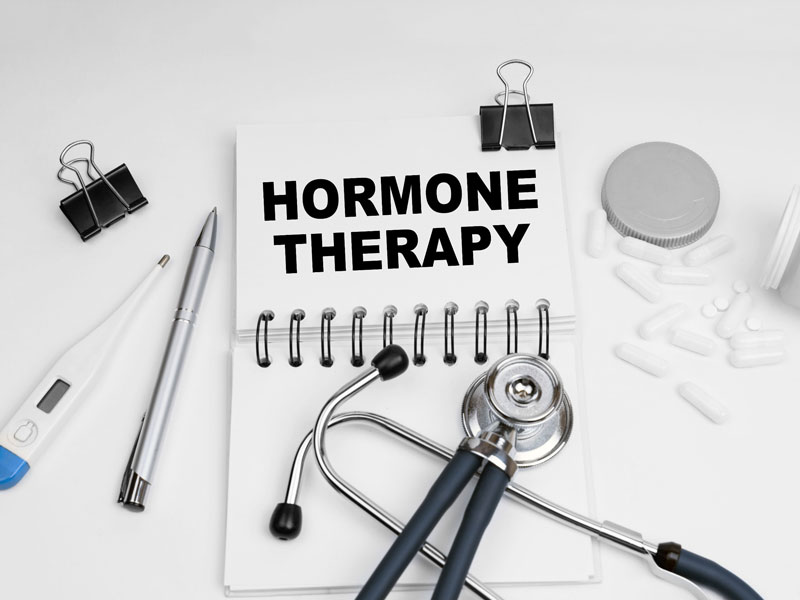USPSTF: No HRT After Menopause for Chronic Conditions
Task Force Advises Potential Harms of Treatment Outweight Potential Benefits
Nov. 10, 2022, 4:14 p.m. News Staff — The U.S. Preventive Services Task Force is advising family physicians and other health care professionals to avoid administering hormone replacement therapy to patients for the primary prevention of chronic conditions after menopause.

The task force’s final recommendation statement, issued Nov. 1 and accompanied by a final evidence review and evidence summary, recommended against the use of combined estrogen and progestin to prevent chronic conditions in postmenopausal people and against the use of estrogen alone to prevent chronic conditions in postmenopausal people who have had a hysterectomy.
Both recommendations received “D” grades, meaning that the task force concluded with moderate certainty that these treatments had no net benefit. Overall, the recommendation statement is consistent with the task force’s 2017 recommendation on the topic.
“For people who have already gone through menopause, using hormone therapy is not an effective way to prevent chronic conditions because the potential harms cancel out any potential benefit,” said Carol Mangione, M.D., M.S.P.H., the task force’s chair, in a USPSTF Bulletin. “Fortunately, the task force has many other evidence-based recommendations on ways people can stay healthy as they age.”
The recommendation statement does not apply to people who are considering HRT to manage perimenopausal symptoms such as vaginal dryness or hot flashes. It also does not apply to people who have had primary ovarian insufficiency or surgical menopause.
Story Highlights
“Importantly, this recommendation is only for people who are considering hormone therapy to prevent chronic conditions after going through menopause,” explained James Stevermer, M.D., M.S.P.H., a member of the task force who also serves as vice chair for clinical affairs and a professor in the Department of Family and Community Medicine at the University of Missouri School of Medicine, Columbia, and medical director of MU Health Care Family Medicine-Callaway Physicians in Fulton, Mo. “Those who wish to manage symptoms of menopause with hormone therapy are encouraged to talk with their health care professional.”
Findings and Research Needs
The task force, after reviewing the available evidence, found that while taking HRT to prevent chronic conditions may result in some modest benefits such as reduced risk of fractures and diabetes, it may also lead to increased risk of severe harms such as stroke or thromboembolic events such as deep vein thrombosis and pulmonary embolism, especially among women older than 60.
The task force also emphasized that the findings pertained to people who use HRT specifically to prevent chronic conditions and not to those who use HRT for the management of menopausal symptoms, which requires different consideration and weighing of benefits and harms.
For individuals who should not receive HRT, the USPSTF pointed to a number of recommendations it has issued related to preventing cardiovascular disease and other chronic conditions in adults. These include the use of aspirin to prevent CVD, screening for hypertension, screening for prediabetes and type 2 diabetes, behavioral counseling to promote a healthy lifestyle to prevent CVD in adults (both those with and without CVD risk factors), and screening for osteoporosis to prevent fractures. The task force also recommended that patients and health care professionals work together to determine the best way to maintain good health throughout one’s lifespan.
The investigators also noted a number of gaps in the existing research, and called for additional studies to determine, among other things:
- whether the age or timing of HRT initiation with respect to menopause affects health outcomes,
- whether the benefits and harms of therapy vary across population groups based on factors such as patient race/ethnicity as well as socioeconomic factors, and
- the comparative benefits and harms of different formulations and treatment durations of therapy.
Updates and Resources
The task force initially posted a draft recommendation statement and draft evidence review on its website from April 19 to May 16.
In response to numerous public comments, the USPSTF revised the Practice Considerations section of the recommendation statement to provide clarifying language on the benefits and harms of HRT, and updated the Supporting Evidence section to include information on a series of trials known as the Women’s Health Initiative.
In addition, the task force provided links to two clinical resources: a JAMA patient page on menopausal HRT for prevention of chronic conditions and a JAMA podcast on HRT for the prevention of postmenopausal chronic conditions.
The AAFP also has produced several member resources on menopause and HRT, including an American Family Physician AFP by Topic collection, results from an AAFP National Research Network study on management of menopausal symptoms and a CME self-study package on women’s health.